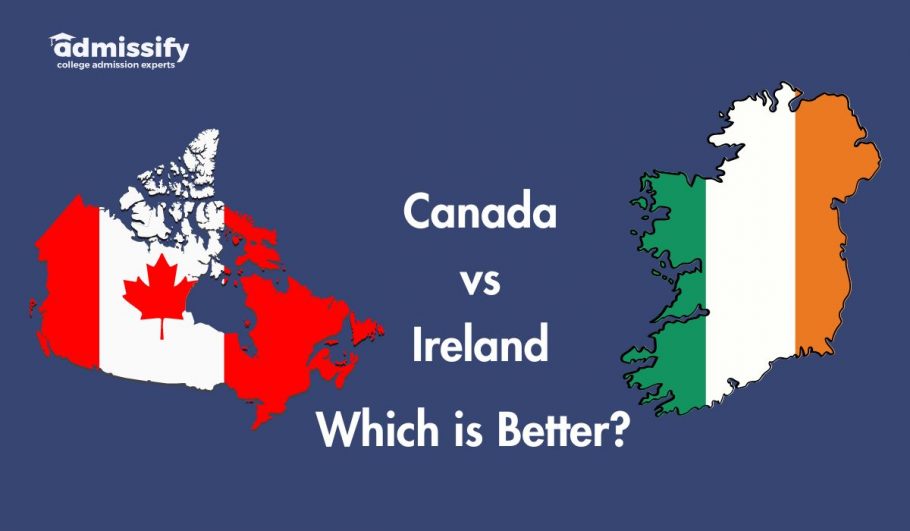Last Updated on December 16, 2024
Indian students’ inclination to study overseas has been increasing (gaining) lately. In order to participate in different circles and expand their personal and professional networks, many students look for opportunities to study abroad. Canada and Ireland are two of the most popular destinations for Indian students who want to study overseas. Which nation should We pick—Ireland or Canada? Given the growing international recognition of both locations as important centers of employment and education, the decision appears difficult. Canada and Ireland each have special advantages and USPs to offer candidates. Here’s a closer look at a few of the factors that could influence your decision while selecting study-abroad locations.
Major Difference Between Canada and Ireland
With more than 41% of all permits going to Indian students, Canada has emerged as the most sought-after destination for Indian students in recent years. Indian students have also increased significantly in Ireland, where there will be over 7,000 of them by 2023, up from over 700 in 2013.
Both nations provide great quality of life, employment prospects, and education, but there are some significant distinctions to take into account.
| Factors | CANADA | IRELAND |
| Vancouver Montreal,and Toronto | McGill University, University of Toronto, University of British Columbia | Dublin City University, Dublin Trinity College, Dublin University College |
| Approximate tuition fee | INR 9L (CAD 14,822) – INR 50L (CAD 82,344) | INR 3L (€ 3,500) – INR 23L (€ 25,600) |
| Top programs | Medicine and Health, Computer science and IT Business administration | Business Analytics, Investment Banking & Finance, Creative Writing Courses |
| Leading Cities | Vancouver Montreal, and Toronto | DublinCork and Galway |
| Standard cost of living | INR 88,000 (CAD 1452) | INR 87,500 (€980) |
| Eligibility criteria for admission | a Class XII minimum score of 60% or above. Universities in Ireland have somewhat more relaxed admissions requirements, but the caliber of instruction is still very good. The online CAO (Central Applications Office) system is used to submit applications for undergraduate courses. scores on the TOEFL and IELTS. You must have a bachelor’s degree or diploma in a suitable field of study in order to enroll in postgraduate courses. | a Class XII minimum score of 60% or above. Universities in Ireland have somewhat more relaxed admissions requirements, but the caliber of instruction is still very good. The online CAO (Central Applications Office) system is used to submit applications for undergraduate courses. scores on the TOEFL and IELTS. You must have a bachelor’s degree or diploma in a suitable field of study in order to enroll in postgraduate courses. |
| Scholarships | Vanier Canada Graduate Scholarships, Lester B. Pearson International Scholarships, President’s International Scholarship of Excellence | India Undergraduate Scholarships, Trinity College Dublin-Trinity College Dublin Global Excellence Postgraduate Scholarships, University College Cork (UCC) Scholarships |
Other than these differences between Canada and Ireland studies, the following are some of the detailed explanations of factors that makes both these countries unique and separate from each other in terms of education and living :
Number of Courses
- There are many different academic programs and courses available in Canada compared to Ireland. Canada provides excellent quality and diversity, with over 15,000 academic programs offered all around the nation.
- However, there are more than 5,000 degrees available in Ireland, with a concentration on subjects like science, technology, and engineering.
Living Expenses
Here’s a comparison of living expenses between Canada and Ireland:
| Expense Category | Canada (Approx.) | Ireland (Approx.) |
|---|---|---|
| Housing | CAD 800 – 2,500 per month | EUR 800 – 2,200 per month |
| Utilities | CAD 150 – 250 per month | EUR 150 – 250 per month |
| Groceries | CAD 300 – 600 per month | EUR 250 – 500 per month |
| Transportation | CAD 100 – 150 per month (public transport) | EUR 100 – 150 per month (public transport) |
| Health Insurance | CAD 50 – 100 (if not covered by provincial insurance) | EUR 100 – 200 (if not covered by public system) |
| Internet | CAD 70 – 100 per month | EUR 50 – 80 per month |
| Dining Out | CAD 15 – 30 per meal | EUR 15 – 30 per meal |
| Entertainment | CAD 50 – 100 per month | EUR 50 – 100 per month |
| Total (Approx.) | CAD 1,500 – 4,000 per month | EUR 1,400 – 3,500 per month |
Notes:
- Housing: Costs vary significantly by city (e.g., Toronto vs. smaller towns in Canada; Dublin vs. rural areas in Ireland).
- Utilities: Include electricity, heating, water, and garbage.
- Health Insurance: Canada has a public health system, but international students may need private insurance. In Ireland, healthcare is a mix of public and private services.
- Overall Living Costs: Ireland tends to have higher costs in major cities, especially Dublin, while Canada can vary widely based on location.

Admission Requirements
- Canada
- To enroll in undergraduate (UG) studies, you must have finished your 12 years of education.
- You must take the SAT in order to be admitted.
- Admission to vocational programs is easier in postgraduate (PG) degrees since the requirements for admission are much more lenient.
- You must take the GMAT in order to get admitted to management programs, while the GRE is required for engineering degrees.
- Colleges in Canada are not subject to the idea of cutoffs. On their websites, colleges list the average scores that are accepted for certain courses. That will provide some insight into what constitutes a respectable score.
- Regardless of the degree, you will also need to take language tests like the TOEFL or IELTS. While certain universities may not demand language exams for Indian students, it is nevertheless recommended that you take the TOEFL or IELTS because they are necessary to obtain a student visa for Canada. Your visa application may be denied if the interviewer is unsure about your ability to communicate verbally.
- Ireland
- A minimum academic score of 60% and above in Standard XII is needed for each course.
- Students who have achieved around 50% can apply for Foundations and Diploma programs. It is expected that the student will be at least eighteen years old when they enroll in a degree program.
- It’s crucial to keep in mind that while Irish institutions have a lower admissions criteria, the quality of education remains the same. Therefore, during the following few years, you need to carefully improve your capacity to handle the high grade of schooling.
- Irish institutions accept applications via the online Central Applications Office (CAO) enrolling system for undergraduate programs. To submit your application, you will need to register on the CAO website, upload your resume, your TOEFL or IELTS score, and your basic information. Through this account, you will receive updates regarding the application process and its many stages.
- An appropriate bachelor’s or diploma is required if you are applying to an Irish university for a postgraduate course. The courses you took for your undergraduate degree must be comparable to and pertinent to the ones you plan to take for your master’s.
- In order to demonstrate their mastery of the English language, candidates would also need to take an English proficiency exam.
Scholarships
| Feature/Aspect | Canada | Ireland |
|---|---|---|
| Types of Scholarships | Merit-based, need-based, and program-specific | Merit-based, need-based, and university-specific |
| Government Scholarships | Canada Graduate Scholarships, Vanier Canada Graduate Scholarships | Government of Ireland Scholarships |
| University Scholarships | Each university offers its own scholarships (e.g., UBC International Scholars, York University International Student Scholarships) | Each university offers its own scholarships (e.g., UCD Global Scholarships, Trinity College Dublin International Scholarships) |
| Value of Scholarships | Ranges from CAD 1,000 to full tuition coverage | Ranges from EUR 1,000 to full tuition coverage |
| Eligibility Criteria | Varies by scholarship; generally includes academic performance, leadership, and community involvement | Varies by scholarship; generally includes academic performance and other achievements |
| Application Process | Typically requires an application form, academic transcripts, and letters of recommendation | Typically requires an application form, academic transcripts, and letters of recommendation |
| Renewability | Many scholarships are renewable based on continued academic performance | Many scholarships are renewable based on continued academic performance |
| Deadlines | Varies by scholarship; often in the spring or summer prior to the academic year | Varies by scholarship; often in the spring or summer prior to the academic year |
Additional Notes:
- Competition: Scholarships can be competitive in both countries.
- Funding Sources: Both countries have government, university, and private organization scholarships.
- International Students: Both Canada and Ireland have specific scholarships for international students, often focusing on academic merit.
Visa Requirements
- Canada
- It is required of you to apply for a work permit 180 days after your studies are completed.
- Indian applicants must undergo a mandatory medical examination as part of the Canada visa application procedure.
- Spouses who want to stay for a year or longer may also work full-time jobs.
- The application fee for this visa is $ 150 CAD.
- You are limited to 20 hours of work each week. The student may work full-time during summer sessions, breaks, and holidays.
- Ireland
- For foreign students who intend to study in Ireland for longer than three months, an application for an Ireland Study Visa is necessary.
- When requesting a student visa, applicants must have proof of at least €7,000 in funds in their bank account. This sum covers an international student’s living expenses in Ireland for a full academic year.
- In addition to the course tuition, you must be able to demonstrate that you or your parents/sponsor will be able to pay at least €7,000 for each year of your study.
- When you have a valid stamp 2, you can work 20 hours a week during the academic year and 40 hours a week in May, June, July, and August, as well as from December 15 to January 15. Since these are Ireland’s vacation periods, more time is permitted for work during these periods.
Which nation is wealthier, Canada or Ireland?
Canada surpasses Ireland in terms of income in relation to GDP per capita. Ireland appears to be in the data when it comes to GDP per capita, however, Canada is richer than Ireland because of Canada’s smaller size and lower population. According to World Bank estimates, Canada’s GDP per person was approximately US$50,770 in 2020, while Ireland’s was almost US$84,590.However, it’s important to keep in mind that GDP per capita does not always indicate personal wealth or well-being; rather, it is only one measure of successful activity. Views of other factors, such social services, standard of living, and economic inequality, may also affect how “rich” a country is perceived.
Work visa for postgraduate studies in Canada and Ireland
Canada
Students who are graduating from any post-secondary institution may work after graduation for a maximum of three years, depending on the length of their education. This is possible with the Canadian Post Graduation Work Visa. The student is permitted to work in any industry or field with this work authorization.
Ireland
After completing your education in Ireland, you might want to extend your stay a little bit longer in order to work and obtain priceless professional experience. Should you possess an Irish-accredited degree, be enrolled full-time, and possess the Visa Stamp 2, you can be eligible for the Third Level Graduate Scheme. The following are the steps in the process:
- After completing the course, students may apply for a non-renewable extension that lasts up to two years. The goal of obtaining acceptable work is the reason for granting this extension.
- Afterwards, you can submit an application for a work visa (called a General Employment visa) or a green card (called a Critical Skills Employment Permit).
- For international graduates who are permitted to work under the Third Level Graduate Scheme, a new visa stamp known as Stamp 1G is now issued. Therefore, you do not need to apply for a visa extension separately if you are issued Stamp 1G.
PR in Ireland versus Canada
- For many international students, obtaining permanent residency (PR) can be their ultimate ambition. Although PR avenues are available in both Canada and Ireland, the procedures are slightly different. With initiatives like Express Entry that give preference to graduates with Canadian experience and qualified professionals, Canada is usually thought to have a more smooth immigration process.
- Faster processing times are also possible; they could take six to eighteen months. The path to permanent residence in Ireland normally entails proving close ties to the nation and maintaining a work permit for a predetermined amount of time—typically two to five years.
- Here, processing times can differ more dramatically. When applying for PR, students who actively seek work experience both during and after their education in any nation may have a big edge.
Popular Positions in Ireland and Canada
Canada
Some of the most sought-after jobs in Canada are those of
- nurse practitioners
- program analysts
- instructors, pharmacists
- financial managers
- construction managers, etc.
Ireland
Some of the top industries in Ireland for jobs are those in
- Software and ICT,
- Financial services,
- Pharmaceutical,
- Medical technology
- Mining, forestry,
- And fisheries, as well as export and trade and software.
Canada and Ireland’s tax systems
- As of 2016, Ireland’s highest tax rate was 48%. In Canada, the highest tax rate that year was 33%.
- In Canada, tax rates do differ significantly, though. In some Canadian provinces, you might receive more money than in Ireland
- However, in some places, like Nunavut, this might be marginally less. In certain categories, Canada delivers better take-home pay overall.
Conclusion
For international students looking to study abroad, Canada and Ireland are both top choices. Both nations provide excellent educational opportunities, a warm and inviting atmosphere, and a diverse range of cultural experiences. Studying in Ireland offers a distinctive and fascinating experience with world-renowned colleges, a lively culture, breathtaking landscapes, and kind people.
On the other hand, studying in Canada offers international students a wide range of options in terms of courses available, job opportunities, and PR opportunities. The nation’s commitment to innovation, research, and education offers chances for both professional and personal growth, and its energetic cities and sleepier towns make for an amazing time for students. In summary, both Canada and Ireland offer the highest levels of education, but they also have advantages and disadvantages.
FAQs
Which country has a higher average cost of living, Canada or Ireland?
There isn’t much of a difference between the cost of living in Canada, which is about INR 88,000 (CAD 1452), and Ireland, which is about INR 87,500 (€980).
How much does it cost to get a student visa to Ireland and Canada?
The price per person for a student visa to Canada, including extensions, is $CAN 150. A single-entry Ireland student visa costs €60, while multiple-entry visas cost €100.
Is Ireland less safe than Canada?
Canada is ranked sixth out of the world’s ten safest countries by the Global Peace Index. The top ten list, which excludes big nations like the United States, the United Kingdom, France, and even Australia, does not include Ireland. This suggests that, in comparison to Ireland, Canada is a safer nation.
Which is less expensive to live in, Canada or Ireland?
Numerous research indicates that overall, Canada is 9.6% less expensive than Ireland. Living expenses in Ireland are 26% more. This implies that your expenses when visiting Canada will be minimal.

Kanishka Garg specializes in crafting informative content on study abroad education. Her passion lies in simplifying the journey for students through SEO-optimized articles and blogs. Kanishka’s commitment to clear communication and her deep understanding of international admissions processes make her blogs essential for students aiming to gain insights into top universities worldwide. With Kanishka’s blogs, students can confidently get solutions to the complexities of applying to their dream universities and achieve their academic aspirations abroad.




